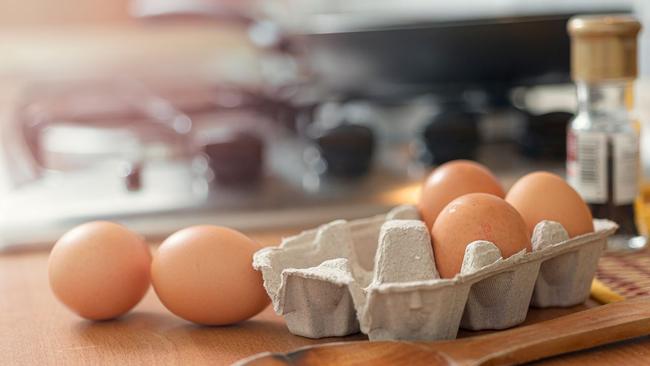How to store eggs
To chill or not to chill? That is the question.

But what caught me was her shock at our eggs. She exclaims: “OH MY LORD, the eggs are not in the fridge, they’re just sitting here on a shelf!”
While this particular supermarket didn’t have them refrigerated, some supermarkets still keep them in the fridge.
So that got us thinking… how should we be storing eggs at home?
How to store eggs properly
For long-term storage of eggs, Australian Eggs recommends that eggs be stored in their original carton in the fridge (5°C or less) as soon as possible after purchase.
While many of us opt to take eggs out of the carton to put them in the specially designed section of the refrigerator, it’s recommended to keep them in the original carton as the carton reduces water loss, protects the eggs from absorbing other flavours and minimises the risk of damage. You should never use eggs that came cracked or dirty, as harmful bacteria may be present.
When eggs go from a cool temperature to an ambient temperature, condensation occurs. Condensation facilitates bacteria growth and penetration of the porous shell. So if you bought your eggs refrigerated from the supermarket it is imperative that they are kept refrigerated. If they were bought at room temperature you have more leeway, but refrigeration for eggs at home is best practice.
What about when I need my eggs at room temperature for baking?
For immediate use, eggs are okay at room temperature – this is especially important when baking (especially with the requirement of room temperature eggs in many recipes).
Taste.com.au’s food director Michelle Southan says: “I have always been told to store eggs in the fridge and to only bring them out when you know you are going to use them and they need to come to room temperature.
“There are a lot of recipes, like cake recipes, where it will specify ‘room temperature eggs’. This is because room temperature eggs emulsify better with butter.”
Preparing and storing homemade foods containing raw eggs
Some of our favourite foods contain raw eggs (mayo and tiramisu, we’re looking at you) so it’s important that these foods are prepared and stored correctly. For all raw egg-based dishes, it’s important to use clean, not cracked eggs.
- Egg-based sauces: an acid – such as vinegar or lemon juice – must be added to acidify the sauce to a pH of 4.2 (or less).
- Meringue: raw egg products can also be heat-treated to minimise risk. For example, in Swiss meringue the egg whites must be heated till they are hot to the touch (70°C), Italian meringue has hot sugar added to the egg whites and a classic pav is baked.
- Mousse: for desserts containing raw eggs (like chocolate mousse) that are not acidified or heat-treated, using an egg separator (rather than the shells) to separate the yolks from the whites is best practice. Keep these desserts refrigerated and consume within a day of making.
Egg recipes we’re loving at the moment
Originally published as How to store eggs


